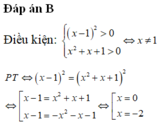Tổng các nghiệm của phương trình log 2 ( x - 1 ) 2 = 2 log 2 ( x 2 + x + 1 ) là:
A. 9.
B. -2
C. 1
D. 0
Hãy nhập câu hỏi của bạn vào đây, nếu là tài khoản VIP, bạn sẽ được ưu tiên trả lời.



\(a,\left(\dfrac{1}{4}\right)^{x-2}=\sqrt{8}\\ \Leftrightarrow\left(\dfrac{1}{2}\right)^{2x-4}=\left(\dfrac{1}{2}\right)^{-\dfrac{3}{2}}\\ \Leftrightarrow2x-4=-\dfrac{3}{2}\\ \Leftrightarrow2x=\dfrac{5}{2}\\ \Leftrightarrow x=\dfrac{5}{4}\)
\(b,9^{2x-1}=81\cdot27^x\\ \Leftrightarrow3^{4x-2}=3^{4+3x}\\ \Leftrightarrow4x-2=4+3x\\ \Leftrightarrow x=6\)
c, ĐK: \(x-2>0\Rightarrow x>2\)
\(2log_5\left(x-2\right)=log_59\\
\Leftrightarrow log_5\left(x-2\right)^2=log_59\\
\Leftrightarrow\left(x-2\right)^2=3^2\\
\Leftrightarrow\left[{}\begin{matrix}x-2=3\\x-2=-3\end{matrix}\right.\\
\Leftrightarrow\left[{}\begin{matrix}x=5\left(tm\right)\\x=-1\left(ktm\right)\end{matrix}\right.\)
Vậy phương trình có nghiệm là x = 5.
d, ĐK: \(x-1>0\Leftrightarrow x>1\)
\(log_2\left(3x+1\right)=2-log_2\left(x-1\right)\\ \Leftrightarrow log_2\left(3x+1\right)\left(x-1\right)=2\\ \Leftrightarrow3x^2-2x-1=4\\ \Leftrightarrow3x^2-2x-5=0\\ \Leftrightarrow\left(3x-5\right)\left(x+1\right)=0\\ \Leftrightarrow\left[{}\begin{matrix}x=\dfrac{5}{3}\left(tm\right)\\x=-1\left(ktm\right)\end{matrix}\right.\)
Vậy phương trình có nghiệm \(x=\dfrac{5}{3}\)

a) \({\log _{\frac{1}{2}}}\left( {x - 2} \right) = - 2\)
Điều kiện: \(x - 2 > 0 \Leftrightarrow x > 2\)
Vậy phương trình có nghiệm là \(x = 6\).
b) \({\log _2}\left( {x + 6} \right) = {\log _2}\left( {x + 1} \right) + 1\)
Điều kiện: \(\left\{ \begin{array}{l}x + 6 > 0\\x + 1 > 0\end{array} \right. \Leftrightarrow \left\{ \begin{array}{l}x > - 6\\x > - 1\end{array} \right. \Leftrightarrow x > - 1\)
Vậy phương trình có nghiệm là \(x = 4\).

\(a,\left(0,3\right)^{x-3}=1\\ \Leftrightarrow x-3=0\\ \Leftrightarrow x=3\\ b,5^{3x-2}=25\\ \Leftrightarrow3x-2=2\\ \Leftrightarrow3x=4\\ \Leftrightarrow x=\dfrac{4}{3}\\ c,9^{x-2}=243^{x+1}\\ \Leftrightarrow3^{2x-4}=3^{5x+5}\\ \Leftrightarrow2x-4=5x+5\\ \Leftrightarrow3x=-9\\ \Leftrightarrow x=-3\)
d, Điều kiện: \(x>-1;x\ne0\)
\(log_{\dfrac{1}{x}}\left(x+1\right)=-3\\ \Leftrightarrow x+1=x^3\\ x\simeq1,325\left(tm\right)\)
e, Điều kiện: \(x>\dfrac{5}{3}\)
\(log_5\left(3x-5\right)=log_5\left(2x+1\right)\\ \Leftrightarrow3x-5=2x+1\\ \Leftrightarrow x=6\left(tm\right)\)
f, Điều kiện: \(x>\dfrac{1}{2}\)
\(log_{\dfrac{1}{7}}\left(x+9\right)=log_{\dfrac{1}{7}}\left(2x-1\right)\\ \Leftrightarrow x+9=2x-1\\ \Leftrightarrow x=10\left(tm\right)\)

a, ĐK: \(x+1>0\Leftrightarrow x>-1\)
\(log\left(x+1\right)=2\\ \Leftrightarrow x+1=10^2\\ \Leftrightarrow x+1=100\\ \Leftrightarrow x=99\left(tm\right)\)
b, ĐK: \(\left\{{}\begin{matrix}x-3>0\\x>0\end{matrix}\right.\Rightarrow x>3\)
\(2log_4x+log_2\left(x-3\right)=2\\ \Leftrightarrow log_2x+log_2\left(x-3\right)=2\\ \Leftrightarrow log_2\left(x^2-3x\right)=2\\ \Leftrightarrow x^2-3x=4\\ \Leftrightarrow x^2-3x-4=0\\ \Leftrightarrow\left(x+1\right)\left(x-4\right)=0\\ \Leftrightarrow\left[{}\begin{matrix}x=-1\left(ktm\right)\\x=4\left(tm\right)\end{matrix}\right.\)
c, ĐK: \(x>1\)
\(lnx+ln\left(x-1\right)=ln4x\\ \Leftrightarrow ln\left[x\left(x-1\right)\right]-ln4x=0\\ \Leftrightarrow ln\left(\dfrac{x-1}{4}\right)=0\\ \Leftrightarrow\dfrac{x-1}{4}=1\\ \Leftrightarrow x-1=4\\ \Leftrightarrow x=5\left(tm\right)\)
d, ĐK: \(\left\{{}\begin{matrix}x^2-3x+2>0\\2x-4>0\end{matrix}\right.\Rightarrow x>2\)
\(log_3\left(x^2-3x+2\right)=log_3\left(2x-4\right)\\ \Leftrightarrow x^2-3x+2=2x-4\\ \Leftrightarrow x^2-5x+6=0\\ \Leftrightarrow\left(x-2\right)\left(x-3\right)=0\\ \Leftrightarrow\left[{}\begin{matrix}x=2\left(ktm\right)\\x=3\left(tm\right)\end{matrix}\right.\)

a, ĐK: \(x-2>0\Rightarrow x>2\)
\(log_2\left(x-2\right)< 2\\ \Leftrightarrow x-2< 4\\ \Leftrightarrow x< 6\)
Kết hợp với ĐKXĐ, ta được: \(2< x< 6\)
b, ĐK: \(2x-1>0\Leftrightarrow x>\dfrac{1}{2}\)
\(log\left(x+1\right)\ge log\left(2x-1\right)\\ \Leftrightarrow x+1\ge2x-1\\ \Leftrightarrow x\le2\)
Kết hợp với ĐKXĐ, ta được: \(\dfrac{1}{2}< x\le2\)

a, ĐK: \(4x+4>0\Rightarrow x>-1\)
\(log_6\left(4x+4\right)=2\\ \Leftrightarrow4x+4=36\\ \Leftrightarrow4x=32\\ \Leftrightarrow x=8\left(tm\right)\)
Vậy x = 8.
b, ĐK: \(x-2>0\Rightarrow x>2\)
\(log_3x-log_3\left(x-2\right)=1\\ \Leftrightarrow log_3\left(x^2-2x\right)=1\\ \Leftrightarrow x^2-2x-3=0\\ \Leftrightarrow\left(x-3\right)\left(x+1\right)=0\\ \Leftrightarrow\left[{}\begin{matrix}x=3\left(tm\right)\\x=-1\left(ktm\right)\end{matrix}\right.\)
Vậy x = 3.


a) \({\log _{\frac{1}{7}}}\left( {x + 1} \right) > {\log _7}\left( {2 - x} \right)\) (ĐK: \(x + 1 > 0;2 - x > 0 \Leftrightarrow - 1 < x < 2\))
\(\begin{array}{l} \Leftrightarrow {\log _{{7^{ - 1}}}}\left( {x + 1} \right) > {\log _7}\left( {2 - x} \right)\\ \Leftrightarrow - {\log _7}\left( {x + 1} \right) > {\log _7}\left( {2 - x} \right)\\ \Leftrightarrow {\log _7}{\left( {x + 1} \right)^{ - 1}} > {\log _7}\left( {2 - x} \right)\\ \Leftrightarrow {\left( {x + 1} \right)^{ - 1}} > 2 - x\\ \Leftrightarrow \frac{1}{{x + 1}} - 2 + x > 0\\ \Leftrightarrow \frac{{1 + \left( {x - 2} \right)\left( {x + 1} \right)}}{{x + 1}} > 0\\ \Leftrightarrow \frac{{1 + {x^2} - x - 2}}{{x + 1}} > 0 \Leftrightarrow \frac{{{x^2} - x - 1}}{{x + 1}} > 0\end{array}\)
Mà – 1 < x < 2 nên x + 1 > 0
\( \Leftrightarrow {x^2} - x - 1 > 0 \Leftrightarrow \left[ \begin{array}{l}x < \frac{{1 - \sqrt 5 }}{2}\\x > \frac{{1 + \sqrt 5 }}{2}\end{array} \right.\)
KHĐK ta có \(\left[ \begin{array}{l} - 1 < x < \frac{{1 - \sqrt 5 }}{2}\\\frac{{1 + \sqrt 5 }}{2} < x < 2\end{array} \right.\)
b) \(2\log \left( {2x + 1} \right) > 3\) (ĐK: \(2x + 1 > 0 \Leftrightarrow x > \frac{{ - 1}}{2}\))
\(\begin{array}{l} \Leftrightarrow \log \left( {2x + 1} \right) > \frac{3}{2}\\ \Leftrightarrow 2x + 1 > {10^{\frac{3}{2}}} = 10\sqrt {10} \\ \Leftrightarrow x > \frac{{10\sqrt {10} - 1}}{2}\end{array}\)
KHĐK ta có \(x > \frac{{10\sqrt {10} - 1}}{2}\)